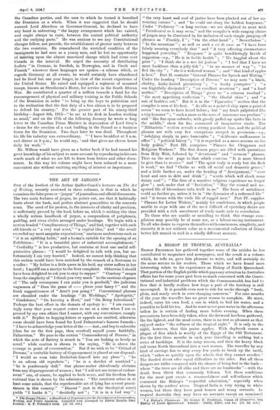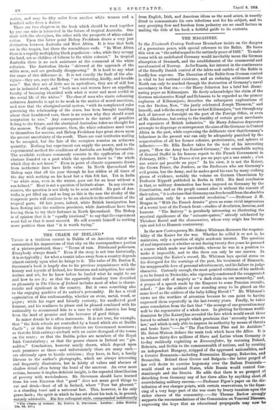A BISHOP IN TROPICAL AUSTRALIA.*
Blume FRODSHAM has gathered together some of the articles he has contributed to magazines and newspapers, and the result is a volume
which, he tells us, gave him pleasure to write, and will certainly de the same service to his readers. Those which we have found most interesting relate to his experiences as Bishop of North Queensland.
That portion of the English public which pays any attention to Australian affairs has for some years past been so much concerned with the Consti- tutional and industrial problems which the Commonwealth has had to face that it hardly realizes how large a part of the territory is still unoccupied. It is possible even now to ride for weeks through "bush, plain, and sandy creek in ever-changing sameness." For nine months of the year the traveller has no great reason to complain. He must, indeed, carry his own food, a can in which to boil his water, and a pannikin to hold his tea. And he must never pass water in the afternoon unless he is certain of fielding more before evening. When these precautions have been duly taken, when the firewood has been gathered, the fire lighted, and the meal eaten, there is no rest so pleasant as that enjoyed under "the softness of the tropical night." It is only to the night, however, that this praise applies. With daybreak comes a plague of flies which is worthy of the Egypt of the Old Testament. For the first three months in each year travelling is nothing but a series of hardships. It is the rainy season, and then the heavy black soil turns North Queensland into a vast morass. The traveller by any kind of carriage has to stop every few yards to break up the earth, which "cakes so quickly upon the wheels that they cannot revolve.' The flooded rivers offer equal difficulties to the rider. But all these dangers are trifles compared with the chance of being lost in the bush— where "the trees are all alike and there are no landmarks "—with the death from thirst that commonly follows; Yet these conditions for the most part create a resourcefulness and self-reliance which command the Bishop's "respectful admiration," especially when shown by the settlers' wives. Tropical India is very trying to white women, but there they have good houses and many servants. In tropical Australia they may have no servants except an occasional • 4 Bialarp's Pleesauoce. By George 11. Prodsharn, Canon Cl Ofence:ger, hes Bishop of North Queensland. London : Smith, Elder, and Co. rs. Oil. net.
native, and may be fifty miles from another white woman and a hundred miles from a doctor.
There are two chapters in the book which should be read together by any one who is interested in the future of tropical Australia. One deals with the aborigines, the other with the prospects of white coloni- ration. Upon this latter point Bishop Frodsham draws a very just distinction between Australia and West Africa. It is true that both are in the tropics, but there the resemblance ends. "In West Africa there is a rapidly multiplying black population—who, while they occupy the land, act as children of Gibeon to the white colonist." In tropical Australia there is no such assistance at the command of the white colonists. The Australian blacks "shivered at the approach of the white man, and are gradually disappearing." It is hard to say what the cause of this difference is. It is not exactly the fault of the abo- rigines —they are, says the Bishop, "an interesting, kindly, and lovable race." But they are of little use in agriculture, they are of still less use in industrial work, and "both men and women have an appalling faculty of becoming identified with what is worst and most sordid in the social life of the whites." The class of man who starts colonizing unknown Australia is apt to be weak in the matter of moral sanctions, and now that the aboriginal social system, "with its complicated rules governing the relationship of the sexes, has been brought tumbling about their bewildered ears, there is no reason why they should resist temptation to vice." Any consequences in the nature of penalties belong to the future, and the aboriginal Australian takes no thought for the morrow. To all appearance, then, the white colonizers must trust to themselves for success, and Bishop Frodsham lays great stress upon the present uncertainty of the result. There are vast territories waiting to be occupied, but the fate of the occupiers remains an unknown quantity. Nothing but experiment can supply the answer, and to the experimental method the conditions of Australia are hardly favourable. The available evidence commonly consists in the application of con- clusions founded on a part which the speakers know to "the whole which they do not know." Even in point of climate arguments drawn from isotherrnic lines have little value. In North Queensland the Bishop says that all the year through he has ridden at all times of the day with nothing on his head but a thin felt hat. Yet in India "no white man, even in the winter, goes out for an hour without a sun helmet." Heat is not a question of latitude alone. In any circum- stances, the question is not likely to be soon settled. No part of Aus- tralia is yet filled up, and so long as this is the case the rivalry of the temperate parts will continue to be an obstacle to the settlement of the tropical parts. Of late years, indeed, white British immigration has been flowing into the southern provinces, while Australians have been leaving them to try their fortunes in North Queensland. The Bishop is of opinion that it is "equally irrational" to say that the experiment must fail or that it must succeed. He will commit himself to nothing more positive than that "it is worth trying."



































 Previous page
Previous page